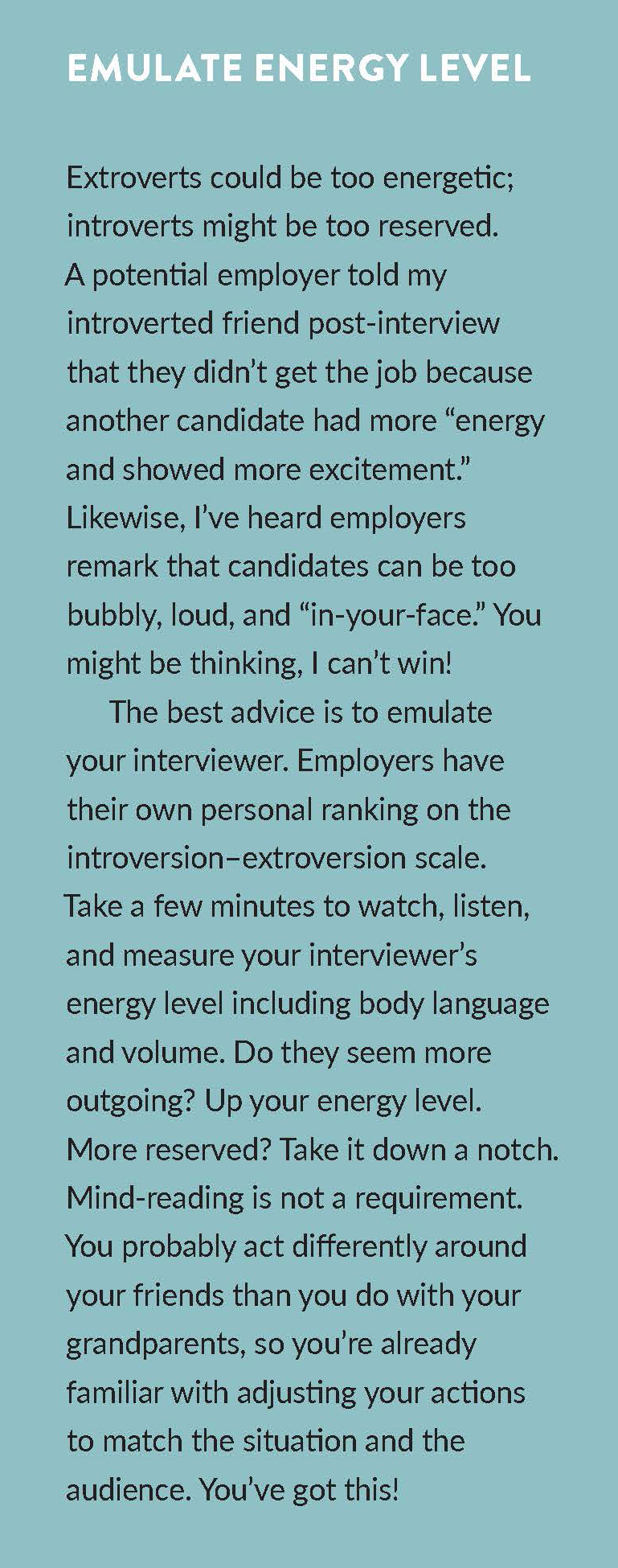- Candidates
- Login
- Setup Account
- Search Tools
- Resources
- Employers
- Employers
- Setup Account
- Login
- Products
- Resources

Interviews: A Guide for Introverts and Extroverts
by Bonnie Johnson, AgCareers.com
THE JOB INTERVIEW is a chance to sell yourself, why you are a good fit for the organization, talk about your achievements, and show your excitement for the position. Just from that first sentence, the whole concept of job interviews seems to favor extroverts. But wait…there are extrovert habits that may contribute to a poor interview performance, and alternatively, ways in which introverts can shine in the interview situation.
Most people lie somewhere in between these two ends of the introversion – extroversion scale. Self-awareness, an essential soft skill, enables you to recognize your emotions, motivations, strengths, and challenges. Self-awareness allows you to understand that you may lean more towards introverted or extroverted.
Even if you think you know where you stand, the following will examine both positive and negative stereotypes, and how you can excel in the interview.
EXTROVERTS
Strengths: Talkative, sociable, curious, positive, energetic, open to change, achiever, leader, quick-thinker
Challenges: Flashy, lack of substance, poor listener, speak before thinking, pushy, in-your-face, rambling
In interviews, this can translate to filling conversation pauses with unnecessary information, unfocused answers, and talking over interviewers. If you already recognize your extrovert strengths, you may fail to properly prepare for an interview, because after all, you’re made to talk!
Suggestions: While your extrovert energy for the job and communication skills should benefit you in an interview, don’t go overboard. In the customary pre- and post-interview small talk, think twice before sharing too personal information.
The typical “Tell me a little about yourself” introduction needs to be just that…“little.” Be wary of taking ten minutes to tell your life history. Keep your story relevant to the job and organization.
Extroverts may excel at sharing their ideas in social situations, but keep in mind that listening is just as important, if not more important. Don’t interrupt your interviewer. Concentrate on what they are saying, not what your next comment will be. Use your naturally curious nature to your benefit by asking questions and expressing your interest in the employer.
Lack of preparation may become an obstacle for extroverts. Prepare for the interview by gathering facts that support your achievements. Practice answering typical interview questions with a concise response. Narrow your list of accomplishments and top skills down, rather than running down the laundry list of why you’re awesome. Look for repeated words or phrases in a job description and you will immediately know what is most important to the employer. What are the job requirements and how can you show you meet them? What about the preferred qualifications? Be ready to have concrete examples to back up your accomplishments.
Extroverts are known for their verbal communication skills, but written communication is also significant in the job search. Bring along a printed copy of your resume and references to the interview. Take a notepad and writing instrument to jot down notes during your interview. Sit down after the interview to review your thoughts then carefully craft a focused follow-up note to your interviewer.
INTROVERTS
Strengths: Listening, trustworthy, analytical, creative, reflective, intuitive, prepared, problem-solver, thoughtful
Challenges: Shy, private, solitary, quiet, reserved, follower, sensitive
Introverts can put too much focus on their perceived lack of verbal communication skills, that they’re already predicting interview failure. Interviews can be scary for introverts, but everyone is anxious before an interview, whether you’re an introvert or extrovert!
Suggestions: When AgCareers.com polled HR professionals and hiring managers, they said that one of the best ways for candidates to stand out was by researching the organization beforehand. Preparedness is an introvert super power —use this to succeed! It will increase your comfort and up your performance.
Find out all you can about the company via their website, social media, and news. Search for information about the people who will interview you, so you understand their role in the organization. Locate this information on the company site or on professional networking sites such as LinkedIn.
Do you know anyone that works for or has interned at the company? Talk to them about the culture and ask for any tidbits of information they could share that might be useful during the interview.
Practice answers to basic interview questions, instilling your personality and experiences so you don’t sound like you’re copying canned responses you’ve read online. Written communication is typically a strength for introverts, so practice by writing out your responses (but never read your written responses in an interview!). Additionally, use your written communication skills and thoughtfulness after the interview to send a thank you note or email. Lean on your reflective nature to highlight what you found most interesting and exciting throughout the interview process. Introverts’ creative skills can also stand out in interview follow-up to make employers remember you.
If you find the interview interaction exhausting, prepare for that too! Refrain from scheduling an interview squeezed between a 9 am class and an 11 am off-campus work shift. On the day of the interview, take some time off before and/or after to organize your thoughts, and recharge yourself for social activity. You’ll be charged up for the interview and reassured knowing you’ve scheduled much-needed quiet time for afterwards.

AN INTERVIEW QUESTION
After all our discussions about the positives and negatives of introversion and extroversion, are you ready to discuss where you land? A common interview question is “Are you an introvert or an extrovert, and why?” Maybe you’ve been doing your best during the interview to hide your shyness and highlight your listening skills, or emphasizing your sociable personality without being overbearing. No matter where you land on the continuum, it’s reassuring to know that a healthy work team is a balanced mix of both. Imagine team meeting productivity with a room full of exclusively extroverts, or all introverts—nothing would get done in either meeting!
When AgCareers.com surveyed ag employers about what they are looking for in students and new graduates, team work was the skill set ranked highest. Some may assume extroverts are naturally team players, but introverts aren’t averse to team work either. Extroverts could discuss their desire to work in a large team, or lead, while introverts may emphasize their small group, or one-on-one teamwork and problem-solving qualities. There are strengths and weaknesses for both extroverts and introverts. For all, practice is an essential element of your interview success. Practice your interview skills with a friend or a trusted advisor. Ask them for honest feedback: are you saying too much, or too little? Cheerful or reserved? Vague or specific?
In summary, for interview success, prepare, practice, recognize, and be ready to communicate your strengths that outweigh any weaknesses you may have, no matter where you fall on the chart.
